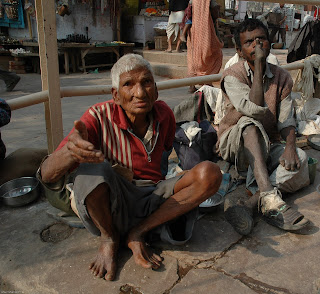Begging: a profession? a misfortune? a job? a scourge? a spiritual practice? an industry? a stain on society? freedom of choice?
Like tipping, the subject of my previous post, begging creates an unequal relationship between giver and receiver, an unbalanced one-way exchange with the amount of money transferred depending on the generosity and intentions of the donor with the receiver having very little to say.
 These are my memories as a seven- or eight-year old child but their enduring clarity has left me curious to hear the stories brought back by American visitors to India to hear how they react to the poverty in general and beggars in particular often a defining part of their experience. Of course beggars are not restricted to India but are found in virtually every country of our planet.
These are my memories as a seven- or eight-year old child but their enduring clarity has left me curious to hear the stories brought back by American visitors to India to hear how they react to the poverty in general and beggars in particular often a defining part of their experience. Of course beggars are not restricted to India but are found in virtually every country of our planet.
However heartfelt these Western views are, they do not begin to chronicle the many-tentacled position that begging actually occupies in the narrative of Indian culture and history. For a more nuanced understanding I interviewed two native-born Indians. I spoke with Mr. S. Swaminathan, or Swami as he asked me to call him, in Chennai, Tamil Nadu, where he conducts motivational and communication workshops. I had came across his satirical article in which his purpose was to reframe beggars as people with professional skills: they understand site selection, for example, by choosing the right place and the right time, they are skilled at “practicing the art of sustained irritation until the alms giver breaks down and puts money in the begging bowl”. They also know how to network to identify clients and learn the latest techniques, from their colleagues, all skills that could be applied to more productive ends. Begging is not a choice, he insists and demands that politicians and society accept responsibility by creating dignity for beggars through viable jobs. “Instead of patronizing the beggar”, he says, “persuade the politicians!”
I spoke with Mr. S. Swaminathan, or Swami as he asked me to call him, in Chennai, Tamil Nadu, where he conducts motivational and communication workshops. I had came across his satirical article in which his purpose was to reframe beggars as people with professional skills: they understand site selection, for example, by choosing the right place and the right time, they are skilled at “practicing the art of sustained irritation until the alms giver breaks down and puts money in the begging bowl”. They also know how to network to identify clients and learn the latest techniques, from their colleagues, all skills that could be applied to more productive ends. Begging is not a choice, he insists and demands that politicians and society accept responsibility by creating dignity for beggars through viable jobs. “Instead of patronizing the beggar”, he says, “persuade the politicians!”
I also stumbled across what its editor, Vikas Kamat, claims is the largest personal blog on the web, citing not only its 4 or 5 million page views a month but also the more than 100 person-years it represents of stories, commentaries and photographs from his India-based family . In an article written by his father before his death and translated by Vikas, we learn about the varieties of begging, ranging from inherited tradition to the temporary and circumstantial to the professional with their sharply defined and defended territorial claims. I urge you to visit this site for a fascinating and illustrated tour through the complexities of begging in India.
When we talked, Vikas explained that donors need beggars, to allow them to learn and practice humility and to provide them “a fast track to heaven” to earn punya or divine credits, sort of like the Jewish concept of mitzvah. In other words, the beggar-donor relationship is symbiotic, with a spiritual rationale, not merely a transfer of money from one person to another. Hindu ritual includes learning how to beg on entering the monkhood or taking a vow to beg for, say, one day a week as an exercise in humility. To become a successful beggar requires many skills and props, including acting, performance, storytelling, wardrobe design, training and outfitting of animals with their decorative dress. (The two black-and-white photos were taken at my parents’ house a long time ago: they had brought in a monkeywallah to perform at their grandson’s birthday party.)
Looking at a beggar’s life from the inside like this makes it appear suddenly colorful and a lot less drab, almost enviable, at least for a short stint.
I wanted to know how Vikas, as an Indian, thinks about those visitors to his country who are overwhelmed and horrified by the beggars and the poverty they witness? Agreeing over cultures, continents and generations with Isabella, he tells me there is no binary answer. It’s part of life, part of India, something he grew up with but also a sensitive, controversial subject–and a dilemma. Patronizing beggars keeps the profession alive but that doesn’t mean we shouldn’t be able to depend on our fellow humans when in need.
 The question then become how to replace all those good karma chips and place-in-heaven tokens and all that soft-hearted guilt with tough love. I have another contrarian question: in a democracy, which India is, don’t beggars have a right to choose their profession? What gives us the right to take it away from them or to relocate them out of sight so they won’t offend the tourists?
The question then become how to replace all those good karma chips and place-in-heaven tokens and all that soft-hearted guilt with tough love. I have another contrarian question: in a democracy, which India is, don’t beggars have a right to choose their profession? What gives us the right to take it away from them or to relocate them out of sight so they won’t offend the tourists?First posted October 23, 2008.













2 Responses
I enjoyed reading your article because for anyone who has spent time in Third World countries like myself and has been privileged it is an issue that we all struggle with. I remember when I was on vacation in Afghanistan 1977 I had an extra hundred dollars and was surrounded by beggars but did not want to give them the safety that that money provided. I promised to remember the conditions .I sought to do something about those conditions in my lifetime. The current project that I am engaged in called restoring paradise is designed to do something to end the conditions that cause suffering in the world. The conditions of extreme poverty that billions of people are still living in. There are 2 billion People living on two dollars or less a day.thanks for writing your thoughtful article.I also have a friend who went to school at Woodstock and who became a teacher there her name was Sherry Sato.
It’s stunning how, out of essentially nowhere, I am now connected to you and your family. A month ago I didn’t know any of you existed and today we’re talking about beggars and Woodstock! Thank you for being so interested–and interesting!